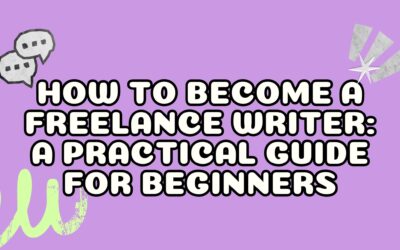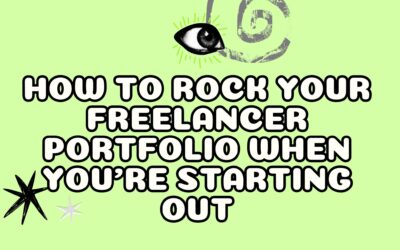We’ve all been there: tricky clients who try to undermine our contracts or those who just don’t pay at all. It’s part and parcel of being a freelancer. Today, I want to share Liz McMahon‘s story about what she learned from a client who refused to pay her for her work. Take it away Liz…
I had committed myself to freelance writing, my website was up and ready for launching, I had some courses under my belt and was ready to rock and roll.
Putting my English teaching books to the back of the cupboard I was ready to enjoy the freedom my new life as a freelancer would give me. After all, that was what the courses I had followed promised me. But first I had to find clients, people who would pay me to build that life.
But where to find said clients?
A course had suggested cold emailing. That I found unattractive, too much like putting myself out there begging for work, my teacher’s mind told me. In fact that teacher’s mind discounted a lot of what I had been told or read about finding clients. But there were job boards. Yes, I could find a client on one of those, a client who would fall in love with my writing and find that he/she couldn’t live without me.
Job boards it had to be.
Payment rates were low but if I did enough writing all would be well I decided. The first two or three jobs went well. I wrote, got paid a little, watched the job board deducting their fee for using their service and dreamt of when my pay pal account would become fatter and I could, well, enjoy the fruits of my labours.
And then it happened!
A job posting surfaced promising regular, consistent work, writing on a range of topics, paying what, to me then a newbie, appeared a reasonable rate. And the client wanted to work outside the confines of the job board saving him from having to pay the job board and me from having to pay my ten or so percent.
Bingo, I had arrived!

Little did I realise that he wasn’t just interested in avoiding paying the company, he was averse to paying me, his writer, also. But it would be a week and 6,000 words later before I began to see red flags and begin to realise the importance of having a contract and protection in this new career of mine.
I wrote product descriptions, articles on meditation, a review on a new Range Rover, one on a device to aid placing bets, an account on a superbug discovered in the U.S., an article on a female runner winning gold in Morocco. That last article led me through a google search to an online sport magazine where it had been published and to the magazine owner who had paid a writer from another job board for the article.
But that was after alarm bells had begun to ring.
The work to be done was sent to me on a daily basis with topics arriving individually to be completed within an hour or two. Regular payments were promised but somehow or other were not reaching my pay pal account. The wide range of topics to be covered couldn’t possibly be coming from one individual business. Red flags and those ringing alarm bells took the place of my dreams of being a successful freelance writer.
I had been scammed and had only my own over confidence to blame for falling into the trap.
And the person I was working for? Well he disappeared without trace.
All communication had been through Skype, he said it was more efficient than email. When I began demanding payment the Skype contact was cut and the client, I learned, also disappeared from the other job board he was getting the work from!
I was angry, very angry. I had worked hard researching, writing and meeting tight deadlines for that money. I had already begun spending it in my imagination. But instead of a shopping trip I was left figuring out how the scam had worked and how my client had come up with the jobs that I was doing for him.
What I Learned From My Experience
But a year later I can thank that client for the lessons learned and laugh at my own naivety. These days I take the advice given by the more seasoned writers out there. Never work without a contract, heed the red flags and never assume that you have all the answers has become my mantra to self.
And thanks to that client I have a stash of articles on topics ranging from outdoor heaters to Human Growth Hormone and writing experience that I might not otherwise have had. All in all, a salutary experience but not one that I would recommend.







Thanks for sharing this story! It sounds very disheartening, but also seems like a valuable lesson learned.
Just wondering though, to either Liz or Lizzie: Should we be asking for payment upfront to avoid situations like this? Or half-payment, etc.? I feel like the idea of just working for a week or however long, and writing that amount of words and sending it off without having some kind of (even partial) payment in hand strikes me as incredibly nerve-wracking.
What kind of payment protocol do you ladies have in place, if you don’t mind sharing?
I suspect that my opinion will be unpopular, but I kind of feel that by violating the TOS of the job board, the freelancer was asking to be scammed, and I’m having a hard time feeling bad for her. I use one particular job board, Upwork, frequently. I regularly get jobs that pay me $125/hour (or the equivalent for fixed price jobs). I happily pay my 10% fee to Upwork, because they connected me with the client. Yes, OF COURSE I’d be happier to pocket that money, but… that would be stealing.
The rules are in place to protect freelancers and clients. And it’s absolutely possible to get great work from job boards — if you know what you’re doing.
Abbi | Successful Freelance Mom recently posted…Yes, You Do Have Time to Write